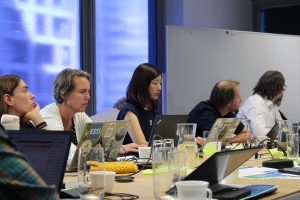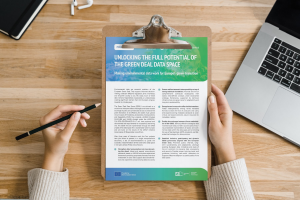
Francesca Noardo (OGC) during her presentation on data spaces and digital twins at the BDTIC 2024.
Data spaces are intended for secure data management and data exchange, while digital twins are designed for data processing. Although both communities are often found to be separate and some concepts do not equally reach across them, understanding that their development is complementary is maybe the only way to enable them mutually. This is the strong underlying message that researcher Francesca Noardo conveyed to the audience of the Building Digital Twin International Congress (BDTIC) held in Barcelona on February 17, 2024.
The researcher and data expert from the Open Geospatial Consortium explored the concept of data space and went through all the initiatives and frameworks under which they are being developed at the European level, as well as highlight key standards. To conclude, Noardo showed the building blocks that have been developed in the framework of the USAGE project, which is investigating the urban objectives of the Green Deal Data Space, and that were processed during the internal hackathon held by AD4GD in Turin in early February.
I think that times are mature for following up on the connection of the data spaces and digital twins for proper collaboration and reciprocal quality.
The main conclusion that can be drawn from the presentation is that these building blocks are part of the paradigm of both data spaces and digital twins and therefore their development is complementary. In this case, USAGE and AD4GD build on each other, and the next step could be a joint effort to revisit the building blocks, map them to standards and use them as a reference to describe and discuss both developing data space solutions.
Building Digital Twin International Conference 2024
The BDTIC is the 4th international conference dedicated to Building Digital Twins. The event focus is set on the building dimension, but it increasingly recognizes the need to extend towards representing cities as a whole and more broadly, to address a range of use cases, some of them related to Green Deal objectives. BDTIC is organized by the Building Digital Twin Association (BDTA) with the collaboration of EUnet4DBP.

The presentation by Francesca Noardo was given within the workshop on civil infrastructures, chaired by Janne Porkka, which is a domain for which interoperability and multiscale analysis and data are mostly needed. The need to properly manage data from data requirements to data sharing has clearly emerged during all the presentations of the sessions, an aspect that data spaces are currently working on intensively.
USAGE project
USAGE acronym is displayed under the meaning of Urban Data Space for Green Deal. This project, financed by the Horizon Europe programme is aiming to provide solutions and mechanisms for making environmental and climate data related to cities available to everyone based on FAIR principles, AI-based tools and data analytics. Their final goal is to use this data from data from Earth Observation, Internet of Things, authoritative and crowdsources, leveraging on standards for data and services interoperability.






